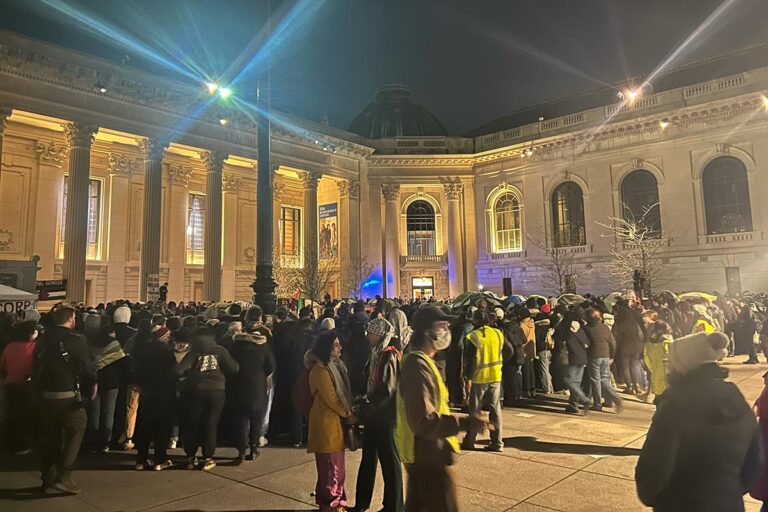
Editor’s note: The author of this article, a current student at Yale, has requested to remain anonymous. We respect their decision and believe their insights are a valuable addition to the ongoing conversation about antisemitism and policy enforcement on college campuses.
As a Jewish student at Yale, witnessing the university’s failure to adhere to its own Free Expression Policy during the ongoing “Occupy Beinecke” protest has been disheartening and troubling. This lack of enforcement not only blurs the line between acceptable and unacceptable forms of protest according to university policy but also emboldens protesters to continue violating these guidelines.
Since April 19, the anti-Israel “Occupy Beinecke” protest has taken over Beinecke Plaza in ways that directly contravene Yale policy. Occupy Beinecke is a coalition of registered and unregistered student groups including Yalies4Palestine, Yale Jews for Ceasefire, Yale Law SJP, and Yale Hunger Strike.
Yale University has clear guidelines regarding time, place, and manner restrictions consistent with the First Amendment. These restrictions include prohibitions on obstructing pathways and doorways, constructing overnight structures, speaking from a megaphone or playing music from a speaker in a disruptive way, and trespassing by refusing to leave a space after hours. The protesters violated all of these rules.
On top of their clear breaches of University policy, protesters tore down the American flag while the group cheered. This action was not sanctioned by the protest organizers, but they did not intervene to stop it either. The inability of organizers to stop problematic and unsanctioned acts of protesters exemplifies the disorder of the protest.
On top of their clear breaches of University policy, protesters tore down the American flag while the group cheered.
Despite clear violations of University policy, Dean of Yale College Pericles Lewis informed the protesters that they could leave their tents up overnight without facing disciplinary action from the university. The protesters remained where they were, attracting more supporters and becoming emboldened by the exception the university made to allow them to stay overnight.
I believe that the university is not adhering to its own policies because it fears that intervention might lead to negative press and an escalation as it did at Columbia. However, each night the administration allows protesters to break the rules only further emboldens them by demonstrating that their actions do not have consequences.
Each night the administration allows protesters to break the rules only further emboldens them by demonstrating that their actions do not have consequences.
By the night of April 20, over 500 protesters were actively involved, with the tents still up and many planning to camp out for a second night in a row. Having faced no discipline thus far, the protesters were enlivened.
A Yale administrator came to the protest with the message that the protesters had until 11:30 pm to leave and take their belongings with them, warning that staying beyond that time could result in disciplinary action. No action was taken, the protesters stayed for the rest of the night, and they are still there as of the time of this writing.
For over 48 hours now, as the students and tents remain in Beinecke Plaza, the protesters have seen the university fail to enforce its own rules. They have seen administrators make empty threats and have not been held accountable for their actions. This sends them the message that they are indestructible and that their actions will remain unpunished.
Jewish students on campus feel scared and intimidated by both the volume of the protest and the university’s failure to enforce its guidelines. It is terrifying to see such a large number of students chanting for the destruction of Israel knowing that the university has not taken any measures to control the protest, despite it being within their right to do so, and with no reason to believe they will act in the future.
Jewish students on campus feel scared and intimidated by both the volume of the protest and the university’s failure to enforce its guidelines.
Jewish students believe that the protest will continue to escalate without the university’s enforcement of regulations, as that is what has been happening in the past few days. We look to our peers at Columbia, deeply saddened that protests at their campus have become so antisemitic and out of control that Jewish students have been told to go home for their own safety. We also fear that without a strong administrative response to the protests on our campus, they will deteriorate to the point where we are in a similar situation to Columbia.
I have, multiple times in the past few days, gone to view and document the protest — never without a group — and have been followed and blocked by protesters in attempted acts of intimidation. As the protest has grown larger and more hostile, I, along with other identifiably Jewish students, no longer feel safe walking past it alone. Yale has failed to protect its Jewish students by not consistently enforcing its own policies.
Originally Published Apr 21, 2024 10:56PM EDT
